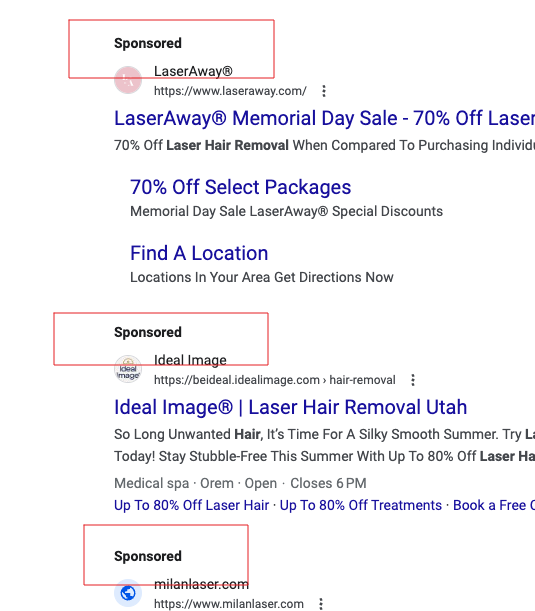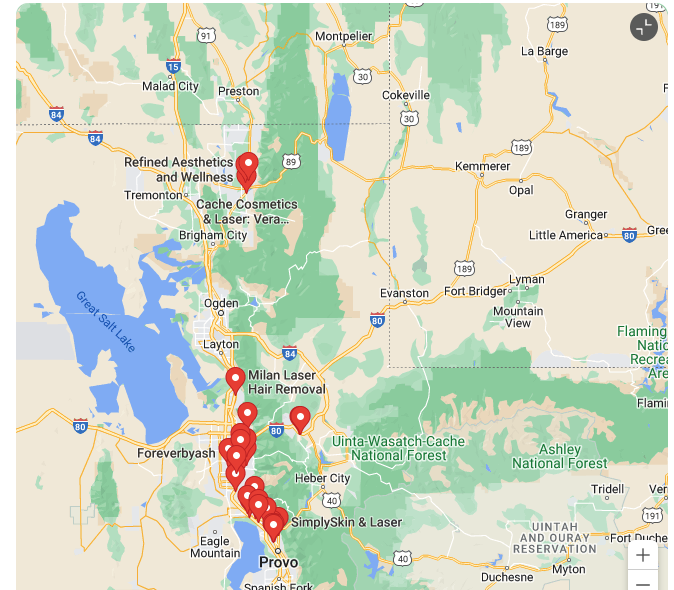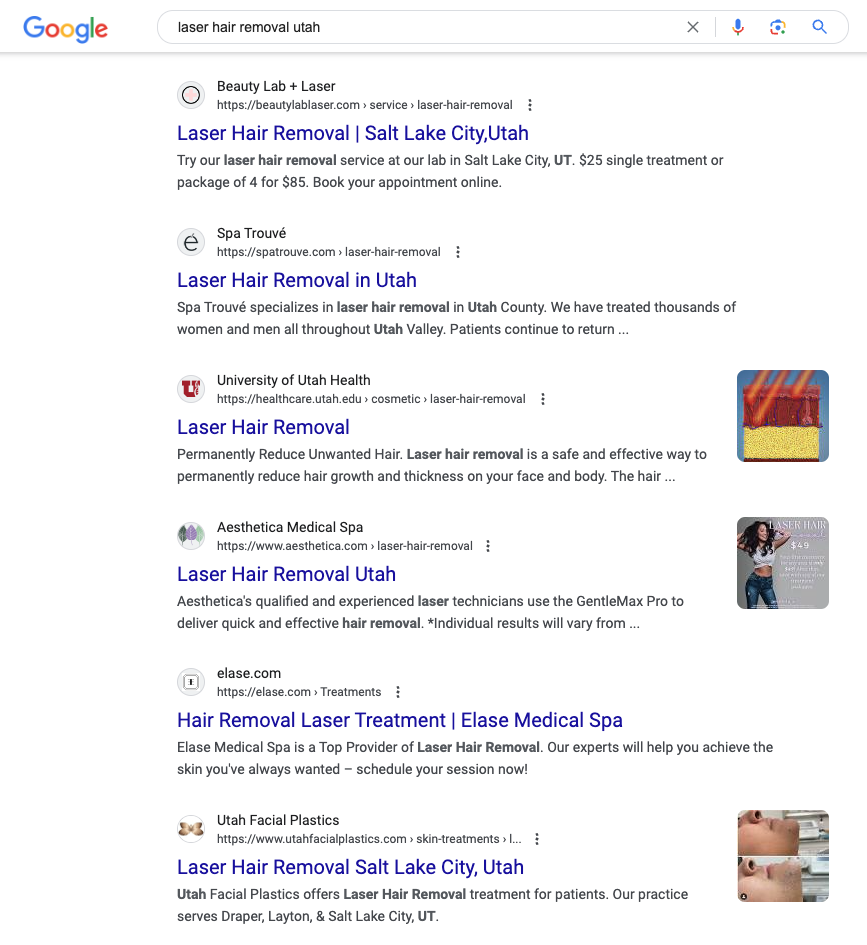Keyword research:
- What is it?
- Why is it important?
- How do I get started?
- What phrases should I go after?
- And what are the next steps?
These are all important questions that need to be answered for any business owner that wants an effective digital marketing strategy.
What is Keyword Research?
And why is keyword research important?
Keyword research is the basis of digital marketing.
It’s how people find us online: on purpose & also accidentally.
Sure, they can find us by looking for our business name – and we should be found easily for this – but there are also keyword phrases that we want to be found for by people that don’t even know our business exists.
These future clients are looking for a specific solution to a problem.
They’re looking for a specific product or service.
They have questions about a product or service.
We should be the business showing up for those phrases!
We should be the solution to their problem!
And this is where keyword research plays a critical role – if we want to help people, we have to be found.
How do I start keyword research?
What keywords should I go after?
Sometimes keyword research can be confusing:
- How do I get started?
- What keywords should I go after?
The best answers to these questions start with more questions:
What do you want to sell most in your business?
What is the most profitable thing you sell?
What I most want to sell may not necessarily be the most profitable, but it could be a gateway into getting clients in the door.
What I most want to sell may be something that’s easy to fulfill or that I’m really good at.
Maybe that’s what I want be found for most.
There aren’t limits on what keyword phrases we can go after, but based on time and budget, we need to narrow it down.
A Keyword Research Example
I’m working with a medical spa right now and as we started keyword research, we found that they are being seen on search for thousands of different keyword phrases.
Not all keyword phrases are created equally though.
I’ve broken keyword phrases down into two different types of phrases:
- Buyer phrases
- Browser phrases
I can imagine you know which one you’d rather be found for.
The buyer phrase means the potential client or prospect has their credit card ready to do something, or at least they’re ready to make a decision.
They may not be ready to pay yet, but if we’re doing a service business, they’re ready to give us information or schedule an appointment or take the next step.
Phrases like “free information” or “how to _______” are more browser phrases than buyer phrases.
It doesn’t mean we don’t want to be found for those; it just means they won’t be the primary phrases we go after in our marketing efforts – at least directly.
Phrases like “laser hair removal” or “laser hair removal near me” or “laser hair removal in my specific city” – these are phrases we definitely want to be found for.
The medical spa offers these services, they’re good at these services, and if people are looking for that specific keyword phrase or phrases like that, we want to show up in the top of search results in our area.
We then want to easily direct those people to our homepage or subpage of our website so they can sign up, schedule an appointment and get the service they’re looking for.
What is the keyword research process?
Once we’ve determined what services or products we want to target in our marketing efforts, we start making a list of keyword phrases related to that product or service.
As a business owner, we may think of all kinds of keyword phrases that could be beneficial.
Some of them may be very, very specific.
Don’t Be Too Specific at First
I’ve been working with an eye doctor. As we talk about keywords and the services he provides, he’s given me keyword phrases that are very medical or technical.
It’s like he’s speaking in a different language sometimes 🙂
Only he and his colleagues would probably even know what those phrases are.
To help him get the right traffic, we decided to focus more on phrases like nearsightedness or farsightedness or Lasik surgery.
These are phrases the general public may be looking for. (We’ll talk more shortly on how we can find out.)
The medical name would not necessarily be a phrase that his ideal client is looking for. We can still explore it though.
Keyword Research Rules & Metrics
As we come up with our keywords and phrases, here are some helpful suggestions.
First, don’t go after one word phrases.
Sure, there are exceptions to this rule, but for the most part a one word phrase is very general.
The keyword “Shoes” for example.
What type of shoes are they?
New?
Used?
Are they men’s?
Are they women’s?
Are they sporting?
Are they are they dress shoes?
Are they casual?
Sometimes just putting in one extra word can really define the type of product or service you’re offering.
Our recommendation is to start with 2 to 3 word phrases.
You can go after longer phrases as well.
These are called long-tail keyword phrases.
Long-tail keyword phrases are very specific, and, if someone is looking for that very specific phrase, they probably are a “Home Run” prospect or client.
Assessing Keyword Research Demand
Once you’ve done some keyword research brainstorming now we want to look at the demand for those phrases.
There are many tools online, some of which are free, that will tell us a high-level overview of what people are searching for.
We can put those keyword phrases in these tools and it will give us some numbers of average searches per month for that keyword phrase.
What I’ve learned in over 20 years of digital marketing is the higher the demand for a keyword phrase the more likely there will also be high competition.
It’s like the law of supply and demand: where there’s lots of demand there’s also going to be potentially lots of supply.
And the same is true with keyword research.
If there’s really, really high demand, we are probably going to also have to deal with a lot of online competitors.
Once we determine the demand for the keyword phrases, many keyword research tools will give us other suggested phrases to consider.
It’s important we assess these as well because sometimes phrases we haven’t thought of might be a perfect phrase to get us the traffic & conversion we need as a business owner.
Who are we competing against?
The next step in the keyword research process is to look at competition.
This can feel overwhelming.
There may be SO MANY competitors online, especially if I’m searching randomly.
For example, when I type in laser hair removal Utah I get pages and pages of results:
- Paid Ads

- Google Maps (based on where I’m located)

- Organic Rankings

How can we ever compete with these companies and get to the top of SERPs (search engine results placement)?
There’s a few ways we can find out who our REAL competitors are, especially for the top of search results.
One of the keyword research tools I use is called Ubersuggest by Neil Patel.
Ubersuggest will tell me the SEO and Paid Ads difficulty with a ranking score.
The lower the number, the better chance I have of getting to the top of Google for that keyword phrase.
Yes, this can give me hope, or it can scare me away from going after certain phrases.
But it’s data that can help my marketing decisions.
Another way we can assess REAL online competition is a function called allintitle:“the keyword phrase”.
This process can take time, but it really breaks down all the websites online that have this specific keyword phrase in their title tag.
This tells us the “real competition.” – the companies who are using the exact keyword phrase we want to go after in the title tags of their web pages.
Taking the Next Steps in Keyword Research
Once we’ve done all this keyword research, we now have an overview of the types of phrases that we can be found for.
Our homepage is the top priority: that’s where we want to use phrases that will give us the best chance to be seen.
But it’s not limited to our homepage.
If we’re offering a variety of products & services, we can use a lot of different keyword phrases on sub pages that are much more specific.
Remember: the homepage is the front cover of the magazine, but there are many pages to a magazine, and sometimes people can find our website coming from a side door or back door and not necessarily going right through the homepage front door.
This is an important thing to remember.
Now it’s time to get started.
Open a Google spreadsheet, put in the first column Keyword Phrase.
In the second column put Demand.
In the third column Competition.
We will start there.
Invitation
If you need help with this or have questions, feel free to click on the link below. This will give you a free download of the spreadsheet template we use for all our clients.
We’ll then start a conversation about your digital marketing goals.
Let us know in the comments below how this process is helping you with your keyword research & digital marketing.